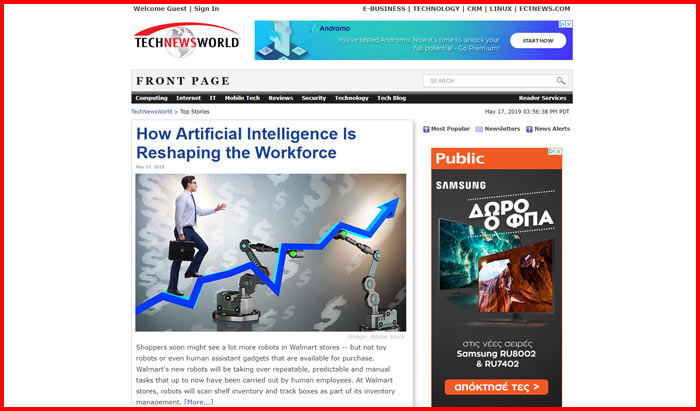What Makes the Best tech blog Stand Out Among Tech Enthusiasts and Experts
What Makes the Best tech blog Stand Out Among Tech Enthusiasts and Experts
Blog Article
How Blockchain Technology Is Revolutionizing Data Protection
Blockchain technology is basically modifying the landscape of information safety by presenting a decentralized framework that assures boosted openness and durability. Unlike conventional systems, which count on centralized information databases, blockchain distributes data throughout a network, lessening susceptabilities and single points of failing. The usage of sophisticated cryptographic techniques guarantees that data remains tamper-proof, cultivating depend on among stakeholders and users. As sectors quickly adjust to this modern technology, concerns occur regarding its wider impact and potential difficulties. What ramifications does this shift hold for future information defense approaches and governing frameworks? The answers might shock you (Best tech blog).
The Fundamentals of Blockchain
Blockchain technology, a cutting edge idea in electronic information management, essentially changes how info is saved and secured. At its core, a blockchain is a distributed ledger that tape-records deals throughout a network of computer systems, guaranteeing openness and immutability. The modern technology runs on a chain of blocks, each containing a listing of purchases. As soon as a block is filled, it is time-stamped and connected to the previous block, creating a chronological chain.
Trick to understanding blockchain is the hashing procedure, which secures purchase information right into an one-of-a-kind alphanumeric code. This cryptographic feature ensures that any type of alteration in the deal data causes a totally various hash, thus guarding versus meddling. The consensus system, another vital component, validates and verifies brand-new transactions with a network of nodes, consequently getting rid of the need for a central authority.
Furthermore, blockchain's append-only structure makes sure that data, once included, can not be erased or changed. This characteristic guarantees a proven and long-term record of transactions, cultivating trust fund among participants. Consequently, blockchain offers a robust structure for data integrity, supplying markets a trustworthy approach for monitoring and managing electronic information in a secure, clear way.
Decentralization and Safety
Decentralization, a core principle of blockchain technology, significantly improves data protection by dispersing control across a network rather than relying upon a single, central entity. This distribution alleviates the risk of solitary points of failure, which are common in typical central systems. By dispersing data throughout many nodes, blockchain guarantees that also if one node is endangered, the entire network continues to be protected. This redundancy not just fortifies the stability of the information but additionally boosts its strength to cyberattacks and system failures.

Furthermore, decentralization encourages users with greater control over their data. Each participant in the network has access to the whole blockchain, permitting them to confirm and examine deals separately. This openness promotes depend on amongst customers, as they do not have to rely upon a main authority to ensure information honesty. Overall, decentralization is critical in enhancing data security in blockchain networks.

Cryptographic Strategies
At the heart of blockchain innovation, cryptographic techniques play a critical function in guarding information, ensuring both discretion and integrity. These strategies are foundational to the blockchain's capacity to securely record deals in a decentralized way. Cryptography in blockchain employs a combination of symmetric and asymmetric formulas to secure data, making it available only to authorized events - Best tech blog. Public and private vital pairs are central to this process, permitting protected verification and identity verification without revealing delicate details.
Hash functions are another essential part, changing input information right into a fixed-size string of personalities, successfully creating a distinct electronic fingerprint for every block. This makes certain that any effort to modify the data will certainly cause an entirely different hash, hence maintaining the immutability of the blockchain. Electronic trademarks validate the authenticity and stability of deals, offering a layer of non-repudiation.
The decentralized nature of blockchain, integrated with robust cryptographic strategies, gets rid of the need for middlemans, decreasing prospective vulnerabilities. As blockchain innovation evolves, innovations in cryptography such as zero-knowledge proofs and homomorphic encryption remain to boost safety and security measures, additionally strengthening data defense in this innovative digital journal system.
Use Cases Across Industries

In the medical care industry, blockchain guarantees the secure storage and sharing of client documents, promoting interoperability while safeguarding delicate information from unapproved accessibility. This technology empowers clients with control over their medical background try this site and promotes seamless coordination amongst healthcare service providers.
Supply chain management benefits substantially from blockchain's immutable ledger, which makes certain traceability and credibility of items from origin to customer. By improving openness, blockchain assists alleviate issues such as counterfeiting and unethical sourcing.
In addition, blockchain's decentralized nature is improving the power market by making it possible for peer-to-peer energy trading, where consumers can purchase and sell excess renewable resource directly. This fosters a much more effective and lasting energy environment.
In the realm of intellectual residential property, blockchain supplies a tamper-proof system for creators to register and protect their works, guaranteeing rightful attribution and reasonable payment. These varied usage instances highlight blockchain's role as an essential force in redefining information security throughout markets.
Future of Information Defense
As we look to the future of information defense, blockchain technology is positioned to play an essential duty in protecting digital details. With its decentralized and immutable qualities, blockchain supplies a durable structure for protecting delicate information versus unapproved gain access to and cyber dangers. This technology makes certain that once information is recorded, it is almost difficult to change without discovery, thus providing a considerable benefit over conventional data storage techniques.
The assimilation of blockchain with various other sophisticated technologies, such as fabricated intelligence and the Internet of Things (IoT), is expected to enhance information defense methods even more. By leveraging clever agreements, companies can automate and implement safety and security procedures, minimizing human error and boosting effectiveness. In addition, blockchain's capacity to supply deducible and clear deals will bolster count on and accountability in information management techniques.
As regulative landscapes develop, blockchain's compliance-friendly nature will certainly become progressively relevant. It can help companies meet rigorous data security regulations, such as the General Data Defense Guideline (GDPR) and the California Consumer Personal Privacy Act (CCPA), by providing proven records of data handling activities. Eventually, blockchain's special qualities setting it as a transformative device in the ongoing quest to safeguard the digital globe against ever-evolving cyber threats.
Final Thought
Blockchain modern technology represents a standard change in information safety by leveraging decentralization and cryptographic methods to enhance openness, count on, and data integrity. Its capability to remove solitary points of failing and employ consensus mechanisms substantially minimizes the threat of fraud and cyberattacks. This ingenious structure not only encourages users with better control over their information however also lines up with regulative conformity. As cyber threats develop, blockchain arises as an important device for durable data defense across numerous sectors.
Blockchain technology is basically try this website modifying the landscape of data protection by introducing a decentralized structure that guarantees improved openness and durability. Unlike standard systems, which depend on centralized information databases, blockchain disperses information throughout a network, minimizing vulnerabilities and solitary points of failing.Decentralization, a core concept of blockchain innovation, significantly enhances data protection by distributing control throughout a network instead than relying on a singular, centralized entity.At the heart of blockchain modern technology, cryptographic strategies play a pivotal duty in browse around this site protecting information, guaranteeing both privacy and honesty.Blockchain technology represents a standard shift in information safety and security by leveraging decentralization and cryptographic strategies to enhance transparency, trust, and information integrity.
Report this page